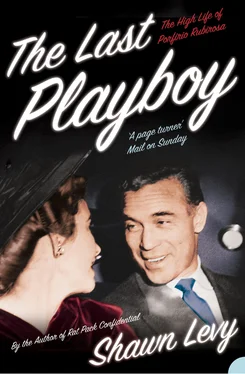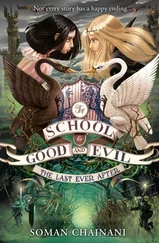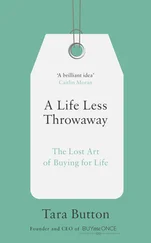In November 1937, the decree was declared; in January 1938, the couple were officially divorced. Separated from Trujillo’s wrath by an ocean, protected by Virgilio and, perhaps, by his ability to implicate the Benefactor in the Bencosme affair, connected more to Paris than he was to his own homeland, Porfirio stayed put, chary but more or less safe and even eager. Having married the boss’s daughter and returned in luxe fashion to the city of his boyhood ramblings, he was ready to take huge gulps of the world.
*Figure $100,000 in 2005.
*The question of who was to blame for the couple’s childlessness would never be answered. Neither ever had children, despite the combined twelve marriages they entered after this first. It was long rumored that Porfirio was rendered sterile by a childhood bout with the mumps, and Flor occasionally hinted that one or both of them had been rendered infertile by a venereal disease Porfirio had contracted in one of his rambles and subsequently shared with her.
*Just the year before, Trujillo had passed a remarkably progressive divorce law that allowed a marriage that hadn’t produced children after five years to be dissolved by mutual consent of the spouses. It was a means for him to leave Doña Bienvenida, with whom he had no children, and marry María Martínez, the mother of Ramfis. Not long after he pulled off this legislative coup and took his third wife, however, he fathered a child—technically a bastard—with his just-divorced second wife.
On the one hand: liberty.
In divorcing Flor, Porfirio had unchained himself from an anchor, but he had also let go of a lifeline.
Yes, she behaved prematurely like an old Dominican dama with her petulant whining about his carousing and his other women, refusing to accept him for the type of man he was.
But: As the daughter of a powerful man, she was a direct conduit to money, security, and stature—and perhaps, given Trujillo’s incendiary nature, life itself. Losing her meant unmooring himself totally from the life he’d known since boyhood, a life implicated in the political goings-on of his homeland.
He lost everything. Before long, dunning letters began arriving at the Dominican embassy in Paris—saddleries and purveyors of equestrian clothing looking for payment on items he’d bought with a line of credit he no longer commanded.
By then, at any rate, he was no longer, technically, an embassy employee. Trujillo had expelled him from the diplomatic corps in January 1938. Virgilio, the generalissimo’s resentful older brother, managed to secure him a temporary appointment as consul to a legation that served Holland and Belgium jointly, but that expired by April. He held on to his diplomatic passport and was occasionally seen around Paris in embassy cars, but he was, literally, a man without a country. He wasn’t about to go home to the Dominican Republic, where his prospects for work were no better than in Europe and his prospects for play considerably worse. Plus, he had already heard from his mother not to risk the trip: Trujillo wanted his head; Paris was decidedly safer.
He was certain in his own mind that Flor hadn’t instigated her father’s fury. Indeed, he would declare that he always harbored warm feelings for her: “After this romantic catastrophe, we stayed good friends.” (They were widely said, in fact, to reignite their sex life whenever Flor, who’d apparently overcome her initial aversion to his lovemaking, was in Europe.) “And,” he continued, “I followed, with friendship, her life.” With friendship and, no doubt, amazement: after divorcing Porfirio, Flor would go on to take another eight husbands, including a Dominican doctor, an American doctor, a Brazilian mining baron, an American Air Force officer, a French perfumer, a Dominican singer, and a Cuban fashion designer. She had a short heyday as a diplomat in Washington, D.C., but during long periods of her life her father disowned her and even had her held under house arrest in Ciudad Trujillo. She would eventually come to dismiss her first husband with a shrug, answering interviewers who asked whether he was handsome or charming with a curt “For a Dominican.” *
And so what to do?
Another man might assess the situation and reckon it was time to think about settling down in France: a wife, a job, kids, a house, responsibility.
Not a tíguere , not with this sort of freedom, not at this time, in this place, with this thrilling sense of possibility and a titillating sense of impending catastrophe. “I was a young man in a Paris that the specter of war had heated up,” he remembered. “I lived a swirling life, without cease, without the pauses that would have allowed me the chance to think and make me realize that giant steps aren’t the only strides that suit a man.”
He spent time at Jimmy’s, a Montparnasse nightclub run by an Italian whose real name too closely resembled Mussolini’s to make for good advertising and who therefore took an American name as a PR maneuver. There, the comic jazz singer Henri Salvador became a friend. Porfirio sat in with his band for late night sessions—his little skill on the guitar and enthusiasm for drums were fondly received—and led parrandas of the musicians and clubgoers late into the night, retiring to this or that partyer’s flat for bouts of drinking and merrymaking that could last until the middle of the next day.
Of course, this sort of traveling circus required funding, and, as its ringmaster no longer enjoyed legitimate work as a diplomat, other strategies emerged. There was the familiar one of living off a woman. La Môme Moineau, the singing, yachting wife of Félix Benítez Rexach, was in Paris and available to him once again as her husband was off earning millions on his various projects in the Dominican Republic. Now, however, she had a fortune to spend on and share with her lover; he drove around the city at various times in one or another of her little fleet of luxury cars; occasionally, he would raise cash by selling off some valuable bijou from her jewel case.
This character—nightclubber, cuckolder, kept man, gigolo, scene maker, skirt chaser, dandy—was not so much a new Porfirio as an evolved one. Nearing thirty, freed of father, wife, and father-in-law—the living connections to his homeland that had thus far defined him—he was no longer an exotic, a Dominican in Paris, but, more and more, a Parisian with intriguingly Dominican roots. He had been an enthusiastic regular in the demimonde; now he was a staple of it. And, free of the constraints of decorum that adhered to him as the son of Don Pedro or the son-in-law of Trujillo, he no longer required so formal and elaborate a name as Porfirio Rubirosa. Anyone who knew him, truly knew him, in Paris after his divorce or, indeed, for the rest of his life, knew him as Rubi . Even more than his mellifluous given name, which he still used to dramatic effect and for official purposes, this new moniker captured his mature essence: the jauntiness, the rarity and high cost, the sparkle and the sharpness and sensuality and the bloody, cardinal allure.
Especially, perhaps, the bloody allure.
Over the years, he would—by virtue of his high living, his obscure origins, his association with Trujillo, his love of thrills and danger—almost inevitably be associated with shadowy events. Most of it was idle gossip. In some cases, such as the Bencosme murder, there were real reasons to think he was involved, albeit peripherally.
And then there was the matter of the Aldao jewels and Johnny Kohane.
For all the munificence of La Môme Moineau, Rubi wasn’t satisfied with his solvency. The life to which he aspired required real capital. He needed a score. In early 1938, while he was still holding, despite Trujillo’s injunctions against him, a diplomatic passport and temporary consular position, Rubi became involved in a scheme to smuggle a small fortune in jewels out of Spain. The goods in question belonged to Manuel Fernandez Aldao, proprietor of one of the most esteemed jewelry establishments of Madrid. In November 1936, when the Spanish Civil War had so turned that Madrid was under siege, Aldao had fled for safety to France and left a good deal of his wealth behind in the form of a safe filled with jewels guarded by an employee named Viega. Two years later, Aldao had need of his resources but was unable to retrieve them himself. He came into contact with Rubi, perhaps through Virgilio Trujillo, and hired him to go to Madrid and use his diplomatic pouch to transport a cache of jewels—and an inventory describing them—back to Paris.
Читать дальше












